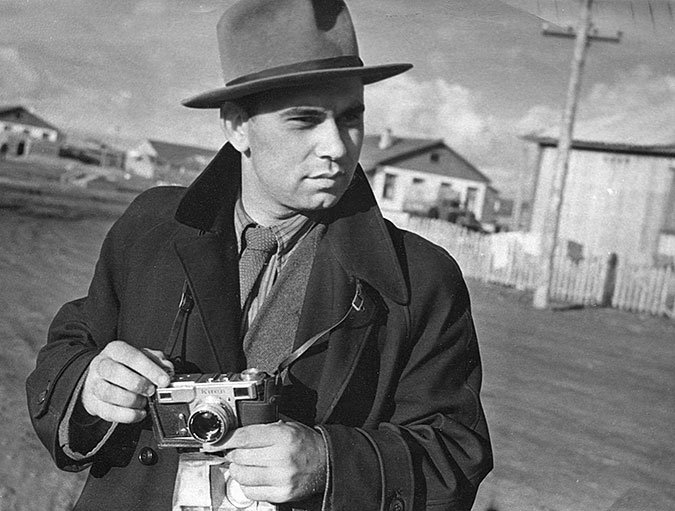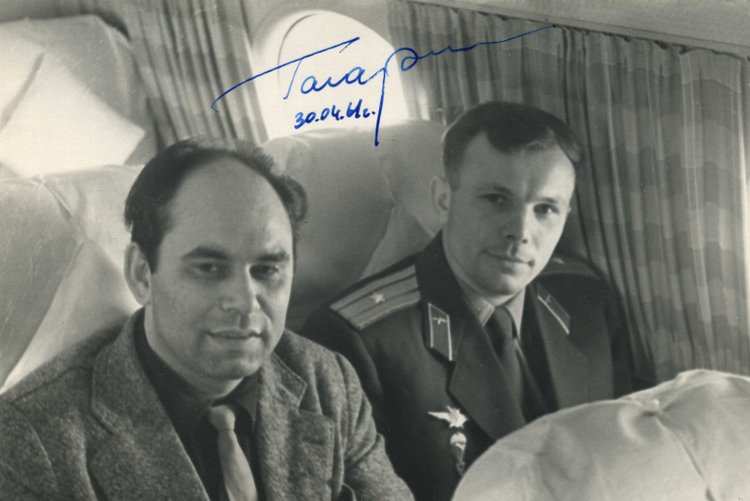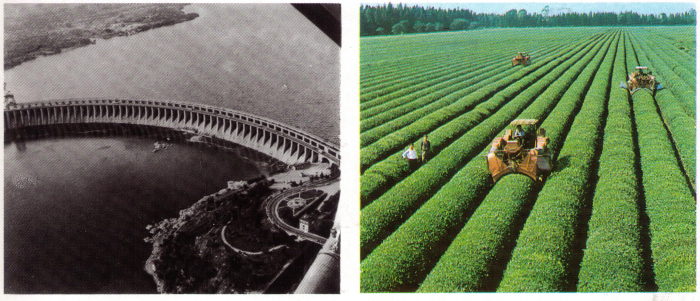Five years ago I made a cross-country trip by helicopter on assignment from Komsomolskaya Pravda. It was a difficult assignment, but an extremely rewarding one, for I was able to visit so many parts of the country in a shorttime. Thus, in the course of a single week I watched tea leaves being picked in the mountain valleys of the Caucasus and a caravan of ships plying through the ice fields off the Chukotka Peninsula. One day I sat drinking tea with a group of Kirghiz shepherds, while three days later I was wandering about a medieval castle in Lithuania. I saw wheat being harvested in the steppes of Kherson, the lights on the oil derricks in Siberia, the village where Lomonosov was born and the blast furnaces of Magnitogorsk. I had always known that ours was an immensely large country, but this journey brought home to methe truly staggering dimensions of a multifarious and richly-endowed nation. I took most of the photographs from the air, which unusual vantage point made it possible to rediscover well-known places from a bird's-eye view.

The second journey was more modest, but of great personal significance and emotional value. In the autumn I travelled on foot and by rowboat from the source to the mouth of the little river in Voronezh Region on whose banks I grew up. This was a rendezvous with my childhood and with a locale that I cherished. These two journeys, one all the way across the country and another, on foot, that is quite accessible to every person, combined to make me realize once again that in our understanding of our native land and in our love for it everything is of importance: the great new construction sites, the sacred places like Yasnaya Polyana and a little bush growing on a hill or a meadow at the edge of a wood. Everything is of importance!

A newspaperman meets many different people, good and bad, colorful and unobtrusive. I was lucky to have met so many fine people. I knew Yuri Gagarin, met with Marshal Zhukov and visited Mikhail Sholokhov in his home. Every reader will understand how memorable and precious such encounters are. However, I can say with as much pride that I know Ivan Rultetegin, a Chukchi, Antonikha, a peasant woman from the Don River region and Zinaida Petrovna Kokorina, a prospector's daughter and the first woman flyer in the Soviet Union. All of them have come from the people. Their strength and talents are indicative of the strength and talents of the entire Soviet people.
Is a journalist in any way bound to the people he writes about? Yes, most definitely, for the lives of these people become a part of his own. He is happy to receive a letter, a phone call, to meet again, to have an opportunity to offer help, if necessary. Thus, Antonikha and I corresponded for many years. I recently received the sad news of her death.

During my travels I saw people at work everywhere: building dams, hewing log cabins, digging village wells, oil wells, fishing, tending flocks, harvesting wheat, sinking mines and making shoes. I even donned diving clothes and walked on the seabed. I have not written about all my encounters, but this kaleidoscope of impressions has produced a vivid image of my hardworking land. Many truths have been brought home to me.
Take flying, for instance. We say that flying and planes have become a part of our lives. However, I really grasped the full meaning of these words after completing an eighteen-month journey by air. As my colleagues and I went over each phase of the journey, we never questioned the possibility of reaching a given spot by air, for planes now fly to most of the remote areas of our country at incredible speeds. I was always able to get a helicopter to take me where I wanted to go. Then again, there is electrification. I saw an interesting lamp in Lenin's room in the Smolny in Leningrad. It contained a light bulb and socket and an oil-burning compartment and wick, just in case. Which meant some fifty years ago people could not trust electricity in Petrograd, the capital of old Russia. In our cross-country travels we never think twice about taking along an electric razor, for one can find an outlet in any part of the USSR, even in remote villages. This small example points up the great changes that have taken place, with Lenin's dream of the electrification of the entire nation come true.
Our country has vast natural resources. It is a beautiful land, inhabited by people whose creative work is guided by the Communist Party. Ours is a nation of fraternal peoples. Such is my native land, the Union of Soviet Socialist Republics.

One man's story is but a tiny contribution to the story of our nation. Still, even the greatest rivers are fed by tiny streams. Look then upon this blog as upon a tiny stream at which one can stop and drink on the way to getting to know the Soviet Union.
